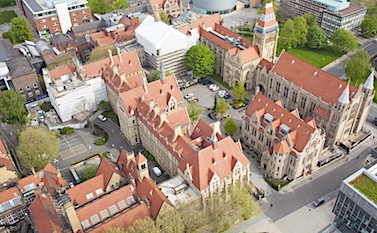The University of Manchester said it teamed up with a new national research hub which aims to position the UK as a world leader in the emerging global field of long-acting therapeutics.
The new Hub for Advanced Long-acting Therapeutics (HALo) will focus on research, public and patient engagement, and creating the infrastructure required for the development and manufacture of new long-acting therapeutics (LATs).
LATs are predicted to revolutionise treatment of health conditions by replacing extensive periods of daily pill taking with a single administered dose.
The approach addresses the issue of missed daily drug doses, which can cause a range of complications, from a lack of efficacy to pathogen resistance. They will also help patients stay on treatment, make it easier to achieve optimal dosing targets and reduce the burden on health systems.
The project is supported with an £11 million grant from the Engineering and Physical Sciences Research Council. The University of Manchester has been awarded £1.5m from the grant to lead efforts to advance multiple strands of LAT research.
The Manchester activity is an interdisciplinary team, led by Dr Tom McDonald, Reader in Sustainable Materials. McDonald is Head of Environmental Sustainability and Engagement for the School of Natural Sciences and is also Research Area lead for Chemical Materials Design within the Henry Royce Institute.
Alongside McDonald is Dr Alejandro Gallego Schmid, Dr Cyrill Bussy, Dr Marilena Hadjidemetriou and Dr Christos Tapeinos.
McDonald said: “Long-acting therapeutics have the potential to address significant challenges in drug administration by offering more convenient, effective, and sustained treatment options.”
“Through our work in HALo, we are bringing advanced materials design, nanomedicine and sustainability evaluation together to accelerate the development of these transformative therapies. We are excited to be part of this national effort and believe that our contributions will help position the UK as a global leader in LAT innovation.”
LATs are emerging as the next landmark for healthcare management; pharmaceutical companies are realising the benefits for clinical outcomes and patient well-being. Such technologies are already in use in fields such as contraception, HIV therapy, and the management of mental health conditions.
By focusing on understanding the physical science that underpins existing successful LAT medicines, HALo will create new proof-of-concept LAT medicine candidates for diseases and conditions where no LAT option exists yet, such as high blood pressure and asthma.
HALo is led by Professor Steve Rannard at the University of Liverpool and the Hub will primarily be hosted within its Centre of Excellence for Long-acting Therapeutics – the world’s first academic centre of excellence focused on LATs.
Rannard said: “Long-acting therapeutics have the potential to simplify the administration of medicines, improve clinical outcomes and reduce the costs of healthcare provision.”
“They are widely predicted to revolutionise disease treatment and healthcare management. HALo provides a much-needed focal point for new LAT developments in the UK and by working with partners it will ensure the UK is on the path to global leadership in this exciting new field.”
